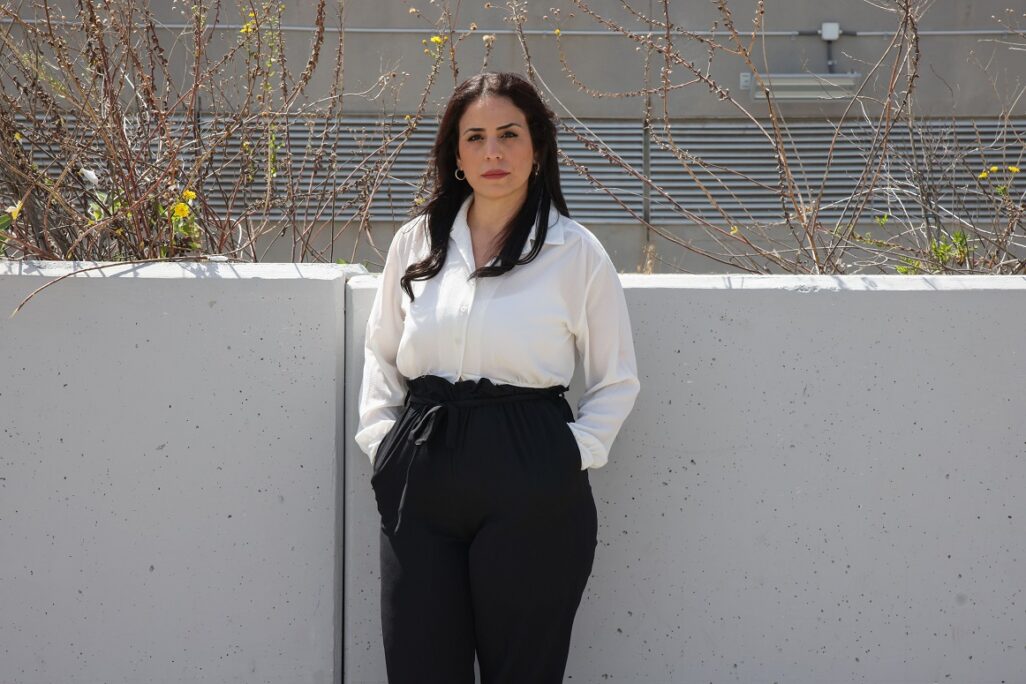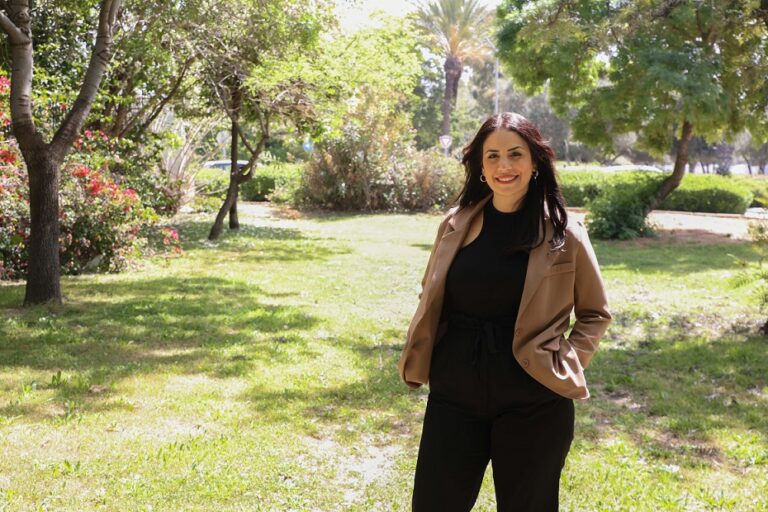
Almog Kamri, an administrative worker at Assuta Hospital in Rishon Lezion, didn’t plan to be the head of a union of 1,300 employees at the age of 33. But after realizing the extent of the poor working conditions of employees at the Assuta chain of hospitals, she decided that she had no other choice.
“In my role, I move between the different departments, and I hear how good the service at Assuta is, and how hard the staff work,” she told Davar. “I saw the hard work they do, the hours they work. I understood that there is room to strengthen them, take care of their well-being, compensation, salary, and shifts. I saw workers come to work disgruntled because everything stays the same and doesn’t change, so I said that change is needed.”
Assuta is Israel’s largest chain of private hospitals, with eight hospitals located in Tel Aviv, Rishon LeZion, Haifa, Be’er Sheva, Jerusalem, Ra’anana, and Ashdod. Until about six months ago, the 1,300 administrative department workers at almost all of Assuta’s hospitals were treated differently from their counterparts in other hospitals in Israel. Unlike workers at other hospitals, Assuta workers were employed under individual contracts, with disparities in wages and conditions. (Employees at Assuta Ramat HaHayal, one of the two Assuta hospitals in Tel Aviv, were already unionized.)
About six months ago, in October 2022, the Assuta hospitals that had not yet unionized signed a collective bargaining agreement, thanks in large part to Kamri’s efforts. For three years, Kamri had secretly led a unionization process across seven hospitals.
Kamri grew up in the cooperative agricultural village Moshav Margaliot, located on the border with Lebanon. Her grandparents came to Israel from Turkey and Iran, and her parents were farmers. She grew up working in the chicken coops and the fields and taking part in activities of the B’nei HaMoshavim labor Zionist youth movement.
“There were turns between the children to clean the chicken coops, wash the eggs. The work was always shared with family and friends. Farming was our whole life, and through farming I learned to love the land,” Kamri said.
She first spent time in the country’s center when she did her national service after high school at Ichilov Hospital in Tel Aviv. After completing her service, she decided to stay in the center and in the medical field. Eight years ago, she started working at Assuta Rishon LeZion. Originally hired as a secretary, she now works briefing medical attendants, receiving patients, and coordinating teams of nurses.
“We didn’t want to leave an opening for the management of interfere”
When Kamri realized she wanted to make a change, she turned to the Histadrut, Israel’s network of labor unions. The nurses and doctors at Assuta Rishon LeZion were already unionized, so she had an idea of the benefits of collective bargaining. She met with a nurse to discuss what it could look like to unionize the administrative workers.
“We would hang out and sit in hidden places. Together we made contact with the Histadrut, and we would sit with them in cafes. We added another cleaning worker to our group and the three of us sat together with the Histadrut and thought, how do we build the union? And then we started,” Kamri said. “We enter the hospital quietly and start being open about it only after there are already enough workers who support the union. So we started distributing flyers quietly.”
At first, the idea was only to unionize workers at Assuta Rishon LeZion. But Kamri soon learned that workers at Assuta Haifa were also looking to unionize.
“When I contacted them and we started talking, we realized that if there is Rishon and Haifa, then maybe there is an opportunity to make a bigger move,” she said.
Kamri and representatives from Haifa went together to Assuta HaShalom in Tel Aviv. They found interested workers and told them about the idea of starting a union across the hospitals.
“But we still didn't think big,” Kamri said. They still hadn’t taken several of the chain’s hospitals into account.

Management at many of the hospitals were very resistant to the attempt at unionization. Despite the opposition, Kamri and her partners managed to collect signatures from about one hundred employees, more than one third of the workers at the hospital and enough to officially establish a union.
After successfully establishing unions in Haifa and Rishon LeZion, Kamri decided the work wasn’t done.
“In three weeks, we just made it happen, and we went to every Assuta hospital. We didn't want to wait for it, we didn't want to leave an opening for the management to interfere, because it happened that members of the management told the employees not to sign on,” Kamri said.
Despite management’s attempts to discourage employees from unionizing, workers that Kamri spoke to felt more comfortable knowing that workers at other Assuta hospitals had already unionized.
“It was a crazy feeling, to go out after a signing operation and mark with a tick that we signed on the workers there. Because there was always a concern if there would be a response. But there was a crazy response and we succeeded, together with the department for workers’ unions in the Histadrut,” Kamri said.
She said that while workers were sometimes wary of hearing the word “union,” hearing the phrase “collective bargaining agreement” was what made many of them ultimately decide to sign on.
Difficult negotiations
Even after the union was established, the road to signing a collective bargaining agreement was long. "We had a conversation with Chair of the Histadrut Arnon Bar David. He referred us to [Chair of the Union of Clerical, Administrative and Public Service Employees] Gil Bar Tal and we joined the Histadrut,” Kamri said.
It took about three years for the Assuta workers to sign an agreement, a period which included the coronavirus crisis.
“The head of our division, Zeinab Mansour, led a process that was not easy at all. The management did not accept the fact that there was a union. The Histadrut sat with us in all the meetings, until midnight, 1:00 in the morning, the night before the eve of Yom Kippur,” Kamri said.
While the negotiations were going on, the leadership of Assuta and the Union of Clerical, Administrative and Public Service Employees both changed, drawing out the talks even further.
“We came with demands, mainly to address the differences between the hospitals and for the agreement to unify the hospitals. We wanted the agreement to unify the salary tables that were different between the hospitals, because there were salary disparities between the hospitals that resulted from the individual contracts that existed. There was a nurse here with a lot of seniority, who had not received a large salary increase for years, who worked alongside newer nurses who earned more than her. It makes the older nurses feel that their experience is not valued,” Kamri said.

Ultimately, the negotiations were a success. The agreement that was signed after three years of negotiations stipulates that workers across the hospitals will have the same conditions. Administrative employees who work on Saturdays now receive a pay bump at the same rate as nurses working on Shabbat. The amount that the hospital pays for meals during shifts was also raised from 27 shekels ($7.38) per meal to 33 shekels ($9.02).
But there is still work to be done.
“Parts of the agreement are still not implemented properly,” Kamri said. “I maintain an intensive schedule of tours in all the hospitals and collect information on the implementation in the field of the agreement. We turned to the management and said that if a discussion on the implementation of the agreement does not come up soon, we will have to activate the breach of trust clause of the agreement.”
Kamri said she relates to her work forming and leading the union as a mission.
“You are not born to be the chair of a labor union, you have to learn it. But I just realized that if I don't do it, no one will,” she said.
This article was translated from Hebrew by Nancye Kochen.






